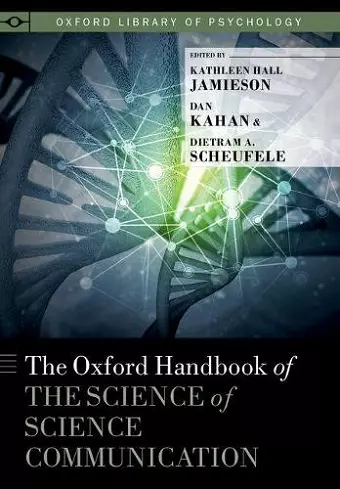The Oxford Handbook of the Science of Science Communication
Kathleen Hall Jamieson editor Dan M Kahan editor Dietram A Scheufele editor
Format:Hardback
Publisher:Oxford University Press Inc
Published:6th Jul '17
Currently unavailable, and unfortunately no date known when it will be back

The proposal to vaccinate adolescent girls against the human papilloma virus ignited political controversy, as did the advent of fracking and a host of other emerging technologies. These disputes attest to the persistent gap between expert and public perceptions. Complicating the communication of sound science and the debates that surround the societal applications of that science is a changing media environment in which misinformation can elicit belief without corrective context and likeminded individuals are prone to seek ideologically comforting information within their own self-constructed media enclaves. Drawing on the expertise of leading science communication scholars from six countries, The Oxford Handbook of the Science of Science Communication not only charts the media landscape-from news and entertainment to blogs and films-but also examines the powers and perils of human biases-from the disposition to seek confirming evidence to the inclination to overweight endpoints in a trend line. In the process, it draws together the best available social science on ways to communicate science while also minimizing the pernicious effects of human bias. The Handbook adds case studies exploring instances in which communication undercut or facilitated the access to scientific evidence. The range of topics addressed is wide, from genetically engineered organisms and nanotechnology to vaccination controversies and climate change. Also unique to this book is a focus on the complexities of involving the public in decision making about the uses of science, the regulations that should govern its application, and the ethical boundaries within which science should operate. The Handbook is an invaluable resource for researchers in the communication fields, particularly in science and health communication, as well as to scholars involved in research on scientific topics susceptible to distortion in partisan debate.
For scholars interested in science communication, the handbook is a valuable tool for understanding both emerging and established topics. For others, it is a sign that the science of science communication has become an academic field in its own right. * Kristian H. Nielsen, Metascience *
This handbook poses a fundamental question about psychology: Where does psychology fit within interdisciplinary research today? Science communication is not a field that has previously come under the umbrella of psychology, but the material in this book, and the way it is presented, will be of interest to a broad range of psychologists. * Phil Loring, The Psychologist *
The Oxford Handbook of the Science of Science Communication is a comprehensive and much-needed resource for anyone concerned with the faithful and effective communication of science. It ably accomplishes the difficult feat of portraying the current state of understanding on this very broad topic while simultaneously presenting concise recommendations for future scholarship and practice. Perhaps most importantly, the Handbook should put to rest the notion that there is insufficient knowledge available to improve efforts to engage the many 'publics' on scientific topics. * Jonathan F. Fanton, President, American Academy of Arts & Sciences *
Familiarity with the discoveries, norms, and ways of knowing of science should not be limited to scientists. By applying the scientific method itself to scientific communication, Jamieson, Kahan, and Scheufele improve the effectiveness with which researchers disseminate their findings and demystify science for broad audiences. * Marcia K. McNutt, President, National Academy of Sciences *
ISBN: 9780190497620
Dimensions: 183mm x 257mm x 31mm
Weight: 1111g
512 pages